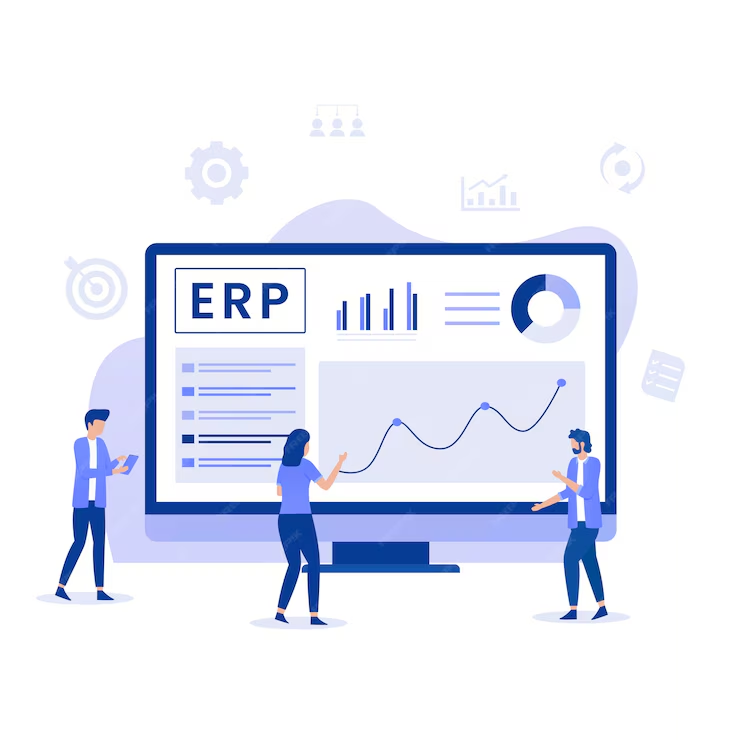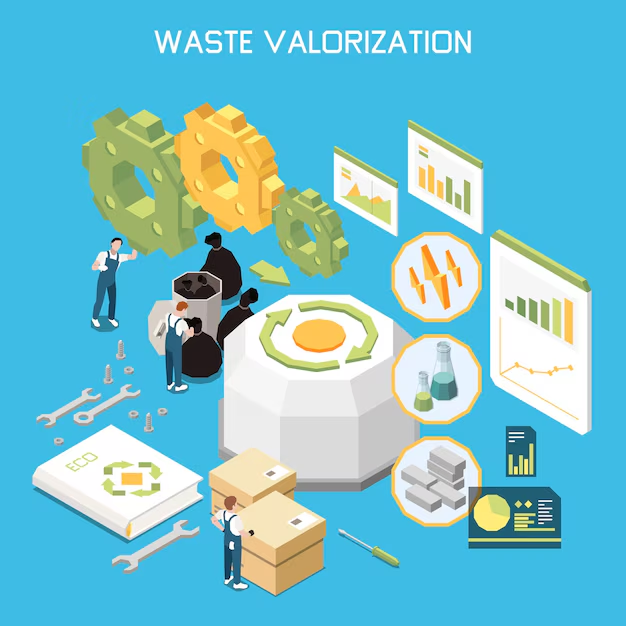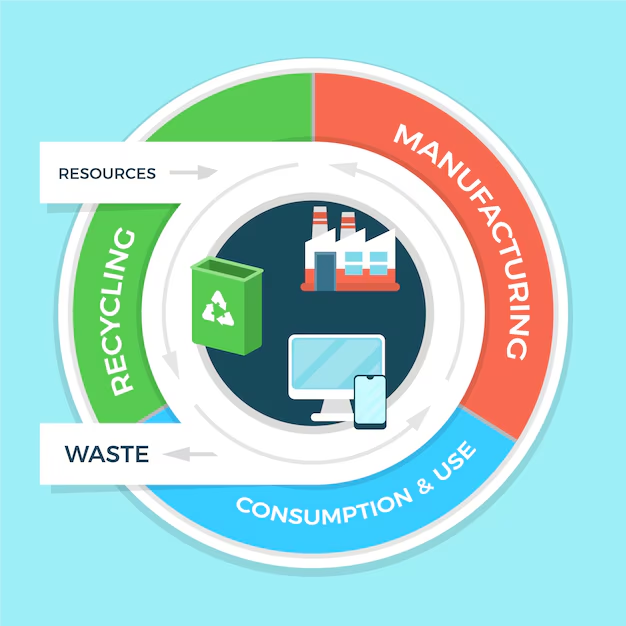In the context of a circular economy and increasingly stringent environmental protection standards, the plastic manufacturing industry is facing significant pressure to reduce waste generation. Traditional production and management processes are gradually becoming ineffective in meeting the requirements for sustainable development. This is the time when Enterprise Resource Planning (ERP) solutions play their crucial role, helping plastic companies not only optimize production processes but also minimize waste, save costs, and enhance management efficiency.
This article will delve into the role of ERP systems in waste reduction and promoting sustainable development for the plastic manufacturing industry.
1. What is ERP?

Read more: What is ERP?
ERP stands for Enterprise Resource Planning, which means an enterprise resource planning system. This is a software that integrates core business processes such as finance, sales, inventory management, production management, and human resources into a single platform. It allows businesses to monitor and optimize the entire process from start to finish, creating connectivity and data automation.
Specifically, instead of each department in the company using its own management system, ERP can now integrate data from all departments into a common management software. Data is entered into the system once and then shared with all relevant departments. This helps minimize data redundancy and duplication, improve operational processes, and increase operational efficiency.
2. Features of ERP in the plastic manufacturing industry
ERP (Enterprise Resource Planning) plays an important role in managing and optimizing plastic manufacturing operations. Here are some outstanding features of ERP when applied to this industry:
Production management:
- Detailed production planning: Develop a detailed production plan based on orders, demand forecasts, and production capacity.
- Monitoring production progress: Closely supervise the production progress of each stage, ensuring adherence to schedule and quality.
- Tool and machinery management: Effectively manage tools, machinery, and production equipment, and schedule regular maintenance.
- Quality management: Monitor and control product quality throughout the production process, ensuring compliance with quality standards.
Material management
- Inventory management: Closely monitor the amount of raw materials in stock, minimizing the situation of excess or shortage.
- Supplier management: Manage supplier information, compare prices and quality to select the appropriate supplier.
- Waste material management: Monitor and manage the amount of waste material, seeking appropriate recycling or disposal solutions.
Financial management
- Production cost management: Monitor raw material costs, labor costs, and general production costs to calculate product costs.
- Budget management: Planning the expenditure budget, comparing it with actual results to evaluate the effectiveness of budget usage.
- Debit management: Managing customer and supplier debts, ensuring stable cash flow.
Human resource management
- Managing employee information: Managing personal information, work history, and evaluating employee performance.
- Salary management: Calculating and managing salaries, bonuses, and employee benefits.
- Training management: Managing training plans, evaluating training effectiveness.
Integrating models
- Integrate MRP models (Material Requirements Planning): Plan material requirements.
- MRP II (Manufacturing Resource Planning): Planning for the entire production process.
- SCM (Supply Chain Management): Supply chain management.
- CRM (Customer Relationship Management): Customer relationship management.
3. How ERP solutions help reduce waste in the plastic manufacturing industry

Helps manage inventory better
Waste is a major challenge for the plastic industry because it cannot be processed in the environment by burning or dumping in landfills. It also harms the environment as well as the industries. There are many reasons for plastic waste in manufacturing industries, such as inventory or storage not being planned properly. Implementing ERP software for plastics in manufacturing and fabrication units is an excellent choice to minimize losses and optimize production. This software will help such industries achieve their goals by eliminating waste through managing inventory based on their lot numbers or corresponding batches. Purchasing raw materials becomes very easy by implementing ERP solutions for plastics in the plastic industry. This software is very effective in bringing stability to production operations and helping to minimize errors.
Reduce waste by accelerating production and manufacturing activities.
The ERP solution for the plastic industry helps plastic manufacturing businesses operate smoothly because the software is cloud-based and runs on a powerful automation system. The software helps plastic manufacturing units optimize production by accelerating plastic production activities. It is important that the entire process is completed within a few hours instead of taking much longer for approval, processing, and producing quality goods, helping to reduce plastic waste.
Limit the overproduction of goods
Excessive production of goods leads to waste in plastic manufacturing businesses. Such issues occur when there is a lack of an enterprise management system, such as inventory overload, unplanned supply chains, and a lack of accurate production forecasting as well as business objectives. With AI-based features, the ERP solution helps businesses make informed decisions about reducing waste by limiting production according to the demands of the manufacturing unit to meet customer expectations on time. This plastic industry ERP only produces a limited number of products based on the orders received from sellers and suppliers.
This software provides several features to address inventory or overproduction issues. It includes demand planning and accurate forecasting. In this way, plastic manufacturing businesses use previous estimates to analyze and forecast projected sales. These have become feasible with the production, storage, and standard productivity of quality goods based on customer demand.
Reduce waste by eliminating production errors and quality defects.
Every manufacturing business wants to minimize errors and defects in the production process to maintain the legacy of their respective brand. This software notifies about any issues in the production process, including post-production defects. It has powerful quality inspection features, making it an excellent tool for addressing quality-related issues and thereby eliminating waste. It enhances product quality and meets customer expectations. These address the ongoing challenges of waste in raw materials and processed goods while maintaining highly efficient production.
Reduce waste through streamlining business operations
One of the biggest reasons plastic manufacturing businesses have so much plastic waste is the unmanaged business processes. When a business operates smoothly in a streamlined process, the likelihood of wasting raw materials and producing goods becomes very small. If you also want to reduce waste in your plastic manufacturing business, one of the best solutions is Plastic ERP. It helps businesses enhance ROI by streamlining all your business operations. You can solve business problems very effectively. Designed to bring stability to plastic manufacturing businesses, this ERP solution offers a centralized integrated business system to make the production process very smooth.
Reduce waste by tracking each batch.
Do you want to eliminate plastic waste in the process of purchasing raw materials and producing plastic goods? Then implement an ERP solution for your business and control raw materials, production, and other activities by tracking and maintaining records of each batch, lot, or batch. Robust inspections and real-time data tracking like this will certainly help your business closely monitor all raw materials or processed goods. In this way, you will know how to manage your inventory and production process, thereby helping to reduce plastic waste.
Automate your business and reduce waste.
If your business is facing some challenges related to plastic waste, try automating your business and making it smarter, more efficient, and results-oriented by using an ERP solution. The automation and AI-based features help the business collaborate with other departments to enhance productivity and generate more and more potential customers. It also helps create a strong bond between your business and customers by providing them with genuine products as early as possible.
Accurate demand forecasting and production planning
With the ability to analyze data and make accurate forecasts, ERP helps businesses predict market demand, thereby planning production accordingly, avoiding overproduction and waste. This is particularly important for the plastic manufacturing industry, where demand forecasting and production optimization help minimize excess materials, unnecessary inventory, and waste generation.
4. The benefits of applying ERP in reducing waste for the plastic industry

4.1 Reducing production and management costs
Thanks to its ability to optimize production processes and manage raw material resources efficiently, ERP helps minimize waste, thereby reducing production costs and waste management expenses. Reducing waste also means that businesses can lower costs related to environmental management and penalties.
4.2 Improving production efficiency and labor productivity
ERP helps monitor and adjust the production process effectively, improving productivity and product quality. Minimizing defective products and optimizing resources help businesses increase labor productivity, maximize profits, and achieve sustainable development.
4.3 Meeting environmental protection standards
The ERP solution helps businesses meet stringent environmental requirements, thereby enhancing their reputation and creating a positive image in the eyes of customers and partners. Compliance with environmental protection standards also helps businesses avoid legal risks and related fines.
5. Conclusion
The implementation of ERP systems in the plastic manufacturing industry brings significant benefits in reducing waste, saving costs, and enhancing production efficiency. In the context of increasing environmental protection requirements, ERP is a solution that helps plastic companies optimize their production processes while meeting sustainable development standards. Although there are still many challenges in the implementation process, with the long-term benefits that ERP brings, this is a strategic direction for the plastic manufacturing industry to advance further and sustainably in the future.